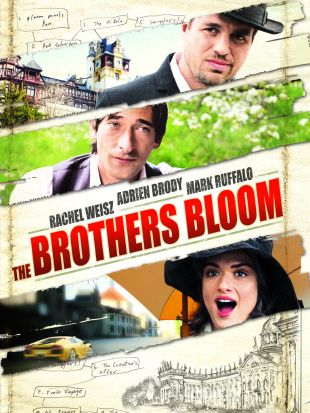
A whimsical throwback to old-fashioned con movies like Trouble in Paradise and Charade, The Brothers Bloom is pretty freaking delightful. It's the sophomore effort of writer/director Rian Johnson, whose debut film, Brick, melded neo-noir dialogue and high school drama into one uniform, hyper-stylized alloy. The Brothers Bloom mixes modes in this way as well, but it draws on a broader catalogue of inspiration, and definitely goes for something way more boisterous and playful.
It starts with the fabled backstory of the two main characters, con artist brothers Stephen (a heavy, grizzled-looking Mark Ruffalo) and Bloom (a gaunt, vulnerable-looking Adrien Brody), whose childhood was spent shuffling about from one foster family to another, showing up in each new town wearing weird matching black jackets and bowler hats, ready to perform some con on the neighborhood that would make them a quick buck before some grown-up caught on and they were kicked out again. Present day finds the two working at the top of their game, bilking their marks out of millions with the help of their third wheel, the badass Japanese minx Bang Bang (comic genius Rinko Kikuchi, who previously earned notice for her dramatic work in Babel), an expert in firepower, demolition, and being the hilariously silent Harpo Marx of the cadre.

However, Bloom, the younger of the two, is suffering from what's apparently been an ongoing existential crisis about his occupation as a confidence man. His brother has always masterminded their grand long-form cons (or, as they call them, plays), writing parts for Bloom that put his enormous puppy-dog eyes and sensitive, soft-spoken demeanor to work, making women fall in love with him, and usually hand over their cash/jewels/priceless artifacts soon after. But Bloom is unsatisfied; he wants what he calls an "unwritten life." He retires to a quaint but lavish seaside villa in the cliffs of Montenegro (one of a few super-European locations that the film uses to play up the ornate, timeless charm), but within a few months, Stephen finds him and proposes one last play before Bloom hangs up his spurs for good.
Heiress and shut-in Penelope Stamp (an almost impossibly cute Rachel Weisz) has a lot of money and apparently, a lot of hobbies (it would be a crime to spoil it, but the montage of all the pastimes she's mastered over the course of her isolated life is just priceless). So the brothers engineer a plan that can offer her some fun and excitement while it offers them the chance to pad their bank accounts with a few million of her many, many millions of dollars. Of course, Bloom ends up falling in love with her for real, and we know that part of the plan could be Stephen's way of giving Bloom the life he wants, so like in any good con movie, the trick is sometimes on the audience. As we try to figure out what's real and what's just part of a play, we also have to wonder whether we're in on it -- which is part of the fun.

The extreme quirkiness, both in the characters and the art direction, is so meticulously peculiar, you may have flashes of Wes Anderson. But Johnson has a much less specific palette when it comes to this stuff, and for the most part, things aren't terminally idiosyncratic, they're just quaint. Johnson still shows an affinity for contrasting the modern with the old-timey; the characters are always seen in rumpled three-piece suits, darling dresses, and many, many derby hats, but now and then the scenery will change from a stately shuffleboard deck to a graffiti-covered alley, and you'll remember that this does, in fact, take place in the present day.
Likewise, the many hilarious comedic moments can make you feel perfectly lost in time, overlapping thoroughly modern sarcasm with clear nods to the Marx Brothers and Laurel and Hardy. (The latter is especially apparent when the camera finds just the angle to juxtapose Ruffalo's big, fat face with Brody's extremely serious cheekbones. The hats don't hurt.) It creates a wonderful combination of wry and ridiculous, of salty deadpan with slapstick chaos. There seems to be much more subtext lurking under the surface in The Brothers Bloom, but for the most part, it's extra credit. If you don't want to go digging into hidden meanings, you don't have to. That's the beautiful thing about a good con -- when it works, you're perfectly happy to just go along for the ride.
